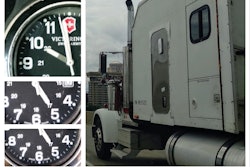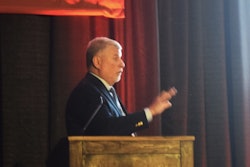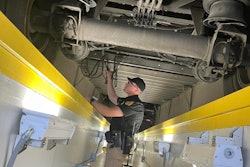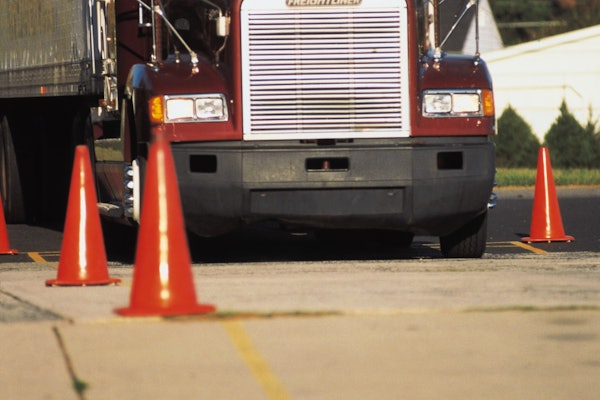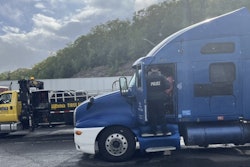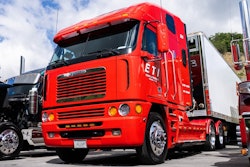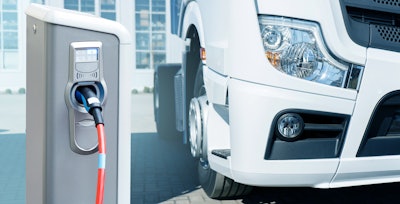
The Environmental Protection Agency recently closed a comment period on a notice seeking feedback on whether the California Air Resources Board’s Advanced Clean Fleets (ACF) regulation should receive a Clean Air Act waiver, which would allow the ACF to take effect.
To be implemented, the ACF needs a Clean Air Act waiver from the EPA. It's the companion rule CARB promulgated alongside the Advanced Clean Trucks rule, which sets sales requirements for so-called "zero emissions" (ZEV) trucks within the state. The ACF, on the other hand, requires certain fleets -- namely port drayage operations and “high-priority” fleets with 50 or more trucks -- to purchase and operate the trucks.
During the 60-day comment period, EPA received 405 comments on the notice, most of which came from individuals and environmental groups in favor of granting the waiver. A number of trucking industry stakeholders, however, largely expressed opposition to the waiver.
Concerns were fairly consistent from organization to organization and company to company. Many commenters stated that the EPA doesn’t have the authority to grant the waiver in the first place, based on the Clean Air Act’s criteria for granting such a waiver.

In addition to trucking stakeholders, attorneys general from nearly half of the states commented in opposition. Led by Nebraska Attorney General Mike Hilgers and joined by 23 other state AGs, the group said that through the ACF, “California is attempting to export its radical climate agenda to our states, using its large population, market share, and access to international ports on the West Coast to force nationwide compliance with its ban on internal-combustion trucks.”
[Related: States challenge latest EPA, CARB truck emissions rules]
The AGs added that their states’ economies “depend on the logistics, farming, and biofuels sectors, and Advanced Clean Fleets threatens all three (and more). Our states are also connected to California via the interstate system. An electric-truck mandate in California means more battery-electric trucks traveling in our states -- a mandate our states did not ask for and do not support.”
The AGs claim that the ACF is illegal for several reasons, including that it violates the Federal Aviation Administration Authorization Act of 1994 and the dormant Commerce Clause of the U.S. Constitution, and that California has failed to carry its burden under each of the three statutory factors that EPA must consider in deciding whether to grant a waiver.
[Related: Trucking to EPA: Send CARB 'back to drawing board' for its ZEV truck-purchase mandates]
Trucking associations line up to object
The American Trucking Associations and California Trucking Association, commenting through the Holland & Knight law firm, said CARB has not met the criteria for a waiver from the EPA. The associations said that the ACF is unlike any other prior CARB regulation that has received a CAA waiver, largely because it applies to fleet operators rather than manufacturers.
The groups also pointed out that under ACF, the same truck would have a different standard based purely on ownership -- a fleet with more than 50 trucks or less than 50 trucks, or a fleet with annual review greater than $50 million or less than $50 million. “CARB has provided no explanation as to how vehicles require different emissions classifications merely as a function of their ownership,” ATA and CTA contended. “There is nothing in the emissions or operations of the selected vehicles that necessitates sub-classifications with different emissions standards.”
The groups also argue that the ACF is ineligible for a waiver because neither CARB nor EPA has completed a “thorough assessment” of the emissions technologies that “will be available for each class or category of vehicles in each model year,” this not complying with the Clean Air Act’s requirements for a waiver.
Separately, in oral comments during the Aug. 14 hearing held by EPA on the waiver request, ATA said CARB “did not understand nor account for the economics and the infrastructure requirements that make it infeasible to implement the regulation on California’s timeline. This will force fleets to rely on compliance extensions, limiting the deployment of zero-emission trucks and resulting in market disruptions.”
The Western States Trucking Association, in conjunction with the Texas Public Policy Foundation and Construction Industry Air Quality Coalition, criticized the EPA for having “repeatedly and willfully failed to abide by the CAA’s statutory text when reviewing CARB waiver requests. Because California does not and cannot show in its waiver requests that the specific emissions standards set forth in the ACF Regulations are needed to meet ‘compelling and extraordinary’ conditions statewide, the waiver request must be denied.”
The groups added that EPA doesn’t have the authority to grant the waiver request “because California does not ‘need’ the ACF Regulations ‘to meet compelling and extraordinary conditions’ in the state, as required by the CAA.”
In addition to concerns over meeting CAA criteria, WSTA and the other groups said CARB didn’t address the issue of emissions associated with electric vehicles and their batteries, including the infrastructure development and the procurement of raw materials needed to support battery-electric trucks.
“Specifically, CARB never addressed the fact that greenhouse emissions associated with manufacturing, processing, and distributing electric vehicle batteries are far higher, on balance, than the emissions associated with traditional mobile sources,” the groups said. Previous research by the American Transportation Research Institute found that the life-cycle emissions of battery-electric trucks are only 30% lower than their diesel counterparts despite the “zero-emissions” tagline they’re often associated with.
The groups also argued that the EPA -- and by association CARB -- doesn’t have the authority to regulate carbon dioxide as a pollutant under the CAA. “The plain language of the CAA grants the EPA no authority to regulate carbon dioxide as an air pollutant,” the groups said. “Because the EPA has no such authority, it cannot grant CARB authority to regulate mobile-source emissions of CO2.”
[Related: Group backed by former AG Barr suing California over rule banning diesels]
The Truckload Carriers Association expressed concerns with the ACF rule and its potential impacts on the truckload sector. “Despite growing interest in reducing emissions, the affordability, reliability, and achievability of electric trucks for nationwide fleets remain significant hurdles,” TCA said.
TCA highlighted trucking’s strides in reducing emissions with existing technologies, such as selective catalytic reduction (SCR), diesel particulate filters (DPF) and exhaust gas recirculation (EGR). “These trucks are already making a positive environmental impact while maintaining the efficiency and reliability that the truckload segment demands,” the association said.
TCA added that CARB did not consider other alternatives in its rule that would have less economic and operational challenges, such as renewable diesel, which TCA said ”offers a seamless, flexible solution for long-haul operations, balancing sustainability and efficiency.”
TCA also expressed concerns about lack of range, increased weight, and a lack of charging infrastructure for electric trucks.
National Tank Truck Carriers, representing trucking’s tanker fleets, called the ACF “arbitrary and capricious,” adding that it “is not technologically feasible within the limited lead time provided” and that the ‘ACF regulations fail to give consideration to costs which will have extraordinary and undue burden on America’s tank truck industry.”
The group further highlighted concerns over the added weight of battery-electric trucks, the cost of ZEVs, and safety considerations, particularly with loads of hazardous materials. NTTC said its members are expressing that ZEV vehicles will not be permitted at their facilities due to the risk of electrical fires or explosions. “ZEV battery combustion poses significant safety concerns at fuel and chemical terminals, and thus are not authorized to load or unload hazardous materials per company policy,” NTTC said. “If tank truck operators are barred from utilizing CARB-mandated ZEV commercial vehicles moving these products, manufacturing, aviation, surface transportation, and other critical sectors will come to a halt -- economic consequences becoming disastrous.”
[Related: California lawmakers ask Newsom to delay Advanced Clean Fleets rule]
The Truck Renting and Leasing Association (TRALA) said “regulators must account for the complex nature and vehicle needs of an industry as widely varied as trucking,” especially for fleets using rented and leased trucks. TRALA said its members’ customers rent or lease trucks instead of purchasing them “due to the cost of new equipment, the complexity involved in undertaking maintenance, and to support seasonal and temporary freight demand surges.”
Those operators “are the businesses least able to manage a transition to zero-emission vehicles due to high capital costs, limited access to fueling infrastructure, and their highly variable operations,” TRALA added. “These challenges are particularly burdensome for small, and often minority-owned, trucking companies operating in California already subject to other state regulations.”
TRALA noted that it supports CARB’s efforts to reduce emissions from the trucking industry, but said the ACF’s “attempt to electrify specific truck classes operating in the state beginning as early as MY 2024 is impractical, ill-advised, and inconsistent” with the Clean Air Act. The group added that “CARB has made overtures to enforce the new ACF rule requirements retroactively, even though the EPA has not yet granted a waiver allowing the rule’s adoption or enforcement. This tactic serves as a heavy-handed threat to fleets operating equipment in California, coercing them to comply before the formal administrative process has concluded.”
The Truck & Engine Manufacturers Association raised similar concerns over the potential for retroactive enforcement of the ACF to the start of 2024. A Dec. 28, 2023, notice from CARB said it reserved “the right to remove non-compliant vehicles added to fleets while the waiver request is pending.” EMA said retroactive enforcement would “nullify the statutory perquisites for public comment and hearing” in the Clean Air Act, adding that if granted the waiver allowing retroactive enforcement, “CARB would have no incentive to seek preemption waivers in a timely fashion, and regulated parties would be compelled to comply with CARB’s regulations in advance of any actual preemption waiver due to the threat of retroactive enforcement.”
The American Truck Dealers group said it supports reducing emissions, but added the effort "requires more than just imposing new standards. The successful path must accommodate the crucial considerations of the commercial truck industry and our country, which depends on trucks to deliver everything.”
ATD noted that manufacturers do not have a truck with a CARB-compliant engine for sale, adding that customers aren’t buying MY 2024 engines because, under the rules, dealers can only sell a diesel truck if they sell the customer an electric truck first. “But customers are reluctant to purchase electric trucks due to cost, lack of charging, and performance challenges. California truck sales are gridlocked by CARB’s aggressive standards. Without significant modifications, some dealers and their customers will start going out of business.”
ATD urged EPA to “consider CARB’s ACF request carefully and with skepticism,” adding that if EPA acts on the request, that it require CARB to revise the rule “to reflect the minimum lead time and stability periods mandated in the Clean Air Act.”
In testimony provided by Owner-Operator Independent Drivers Association Director of Federal Affairs Jay Grimes during an August EPA hearing on the waiver, Grimes and OOIDA expressed concerns that future CARB regulations "will implement aspects of ACF for small carriers" and others currently outside the ACF's scope. Grimes also referenced ATD's comments regarding the lack of CARB-compliant engines currently available to meet the requirements of the rule.
"Furthermore, purchasing zero-emissions heavy-duty vehicles is challenging for motor carriers in the absence of national and regional charging infrastructure networks," Grimes said. "Professional drivers are skeptical of ZEV costs, mileage range, electric battery weight and safety, charging time, and availability."
[Related: California dealers struggle to withstand CARB sales regulations, offer warning to opt-in states]
The Clean Freight Coalition, an alliance of truck and bus transportation association stakeholders working toward clean energy that is “sustainable, affordable and does not jeopardize the nation’s supply chain,” asked that EPA decline CARB’s request for a waiver for the ACF rule. The CFC said its members have identified a number of issues with “the singularly focused battery-electric mandate,” including equipment cost, infrastructure, payload and range.
Instead of a battery-electric focus, the CFC offered other solutions to help reduce truck and bus emissions, including renewable diesel and biodiesel.
CFC also laid out why it believes EPA cannot grant the waiver under the Clean Air Act. First, the group said, “EPA lacks the authority to promulgate the regulatory provisions set forth in the ACF Rule, and EPA cannot grant a waiver for regulatory standards that exceed its own authority.” Second, echoing other commenters, CARB’s request doesn’t meet the CAA’s “compelling and extraordinary conditions” requirement, CFC said, and the ACF doesn’t meet the lead time requirement of the CAA.
Trucking companies concerned over range, infrastructure, safety
California-based tanker fleet Lamb Fuels, a 2022 Overdrive’s Small Fleet Champ semi-finalist, weighed in on the ACF regulation, saying it’s “not technologically feasible within the limited lead time provided.” The company acknowledged strides made by battery-electric trucks in certain sectors, but noted their adoption for fuel tankers presents challenges.
Many of those challenges were highlighted by others opposed to the waiver, including battery capacity and range, charging infrastructure, charging time, payload capacity, cost, safety concerns and more.
Lamb Fuels included concerns over the risk of battery fires, particularly problematic around explosively flammable materials like gasoline. Additionally, fire suppression systems used at gasoline loading facilities “are designed to address fires involving liquid fuels and vapors,” the company said. “The presence of high-voltage electrical systems in electric vehicles introduces new fire hazards that may not be adequately addressed by existing fire suppression infrastructure. Upgrading these systems to handle both electrical fires and fuel fires could involve significant costs and engineering challenges.”
[Related: Calif. small fleet, advocate: CARB policies don't reflect reality, pushing out independents]
Florida Rock & Tank Lines, similarly, hauls petroleum products. The company said the range limitations and the charging time of battery-electric trucks would not allow its drivers to perform their normal duties within the federal hours of service. “If zero-emission tractors were mandated with the recharging downtime required, it would require substantially more trucks and drivers to transport the same amount of freight as transported by combustion engine powered trucks,” the company said.
The company also raised concerns over decreased payload due to the increased weight of battery-electric trucks. “Again, this would require more trucks and drivers to transport the same amount of freight.”
Ryder System was critical of the ACF, noting that it “mandates fleets transition to zero-emission vehicles on a timeline that is largely unachievable and will come at tremendous economic costs.” The company went on to say that the rule, as currently written, “ignores how trucking fleets operate, the electricity-generation challenges facing California’s utilities, the gaping chasm between charging infrastructure needed to support the ACF and what is actually available, and the exorbitant costs tied to these concerns.”
Penske Truck Leasing raised a number of concerns over the ACF rule, including for short-term-rental fleets. The company said it believes under the ACF, as written, it will “never be able to achieve full compliance … due to the immutable fact that we cannot control which vehicles our rental customers bring in from out-of-state nor when they do so.” Penske sought an exemption and offered recommendations to CARB to remedy this concern, but “unfortunately, CARB did not adopt Penske’s common-sense rental fleet recommendations.”
Like others, Penske also raised concerns about the existing charging infrastructure, or lack thereof, along with financial challenges of ZEVs, payload and range limitations, and more.
Drayage fleet 4 Gen Logistics, which said it already operates 79 ZEVs and plans to be a 100% ZEV fleet in 2025, bucked the trend of trucking commenters and supported CARB’s effort to obtain a waiver. The company said that “approving the waiver for California’s ACF program is essential for addressing the state’s environmental and public health challenges, achieving national climate goals, and providing market stability for the ZET industry.”
The company said the technology readiness for ZEVs “has reached a point where widespread adoption is possible,” adding that advancements in battery-electric and fuel-cell-electric technologies has made those “viable options across various applications, including long-haul freight.”
The company added that the "certainty ACF provides will spur private investment in zero-emission infrastructure and technology,” addressing many of the concerns from others in trucking about charging challenges.
Another drayage fleet, Hight Logistics, also urged EPA to grant CARB’s waiver request, using a similar comment template as 4 Gen.
[Related: Supreme Court deals major blows to federal regulators]
CARB’s own argument for the waiver
CARB argued that EPA “must grant” the waiver because “the language of the [CAA] statute and its statutory and legislative history establish a presumption that California’s requests should be granted.”
CARB said it determined that the ACF would not “cause California motor vehicle or off-road engine emission standards, in the aggregate, to be less protective of public health and welfare than applicable federal standards,” noting that determination was not “arbitrary and capricious,” and thus EPA cannot deny the waiver.
The agency also argued that California “needs” the ACF “to meet compelling and extraordinary conditions” because the state “continues to struggle with the severe air pollution conditions that Congress considered ‘compelling and extraordinary’ when it enacted the waiver provision in 1967.”
Finally, CARB said the ACF is consistent with Clean Air Act Section 202(a), as required by the CAA’s waiver provision. The agency said under the long-standing interpretation of the provision, EPA can only deny a waiver if “the state’s regulations … provide ‘inadequate lead time to permit the development of the technology necessary to implement the new procedures, giving appropriate consideration to the cost of compliance within the time frame.’”
[Related: 'Washington is not California': State's truckers on 'zero-emission' rules]
Contrary to a number of commenters from the trucking industry, CARB argued that the ACF’s requirements “are feasible within the lead time provided.”
In its comments, CARB also addressed concerns from other commenters regarding whether the state’s electrical grid can handle the demands of medium- and heavy-duty ZEVs. The agency said the existing grid and approved investments to the grid that are already occurring can meet the near-term needs of “millions of ZEVs.”
CARB added that the grid “may well need to expand in later years to meet the energy demands of the medium- and heavy-duty ZEVs required by the ACF regulation; however, the regulation requires affected fleets to gradually acquire ZEVs over several decades [emphasis in original], which provides California sufficient time to both assess and implement needed expansions of the grid, especially since those future demands are projected to be relatively modest in relation to total statewide demands.”
The agency also noted that hydrogen production in the state is expected to grow to support the adoption of fuel-cell-electric trucks.
Addressing concerns over charging infrastructure, CARB said the state currently has 75 publicly accessible charging and hydrogen refueling stations for medium- and heavy-duty BEVs and FCEVs, under development or operating, that will collectively provide 1,350 nozzles for BEVs and 72 nozzles for FCEVs. Fifty-four of those stations offer or will offer charging services for BEVs, with 1,020 nozzles, and 15 stations offer fueling stations for FCEVs, with 50 nozzles. Six stations will offer both charging and fueling services, with 330 nozzles for BEVs and 22 nozzles for FCEVs. Privately accessible charging stations -- including those at home bases for fleets -- add an additional 8,000 nozzles for BEVs, CARB noted.
Incentives from federal, state and local sources “are anticipated to result in a widespread expansion of California’s electrical and hydrogen fueling infrastructure needed to meet the energy needs,” the agency said.
[Related: Could hydrogen internal combustion help solve trucking's emissions problems?]




